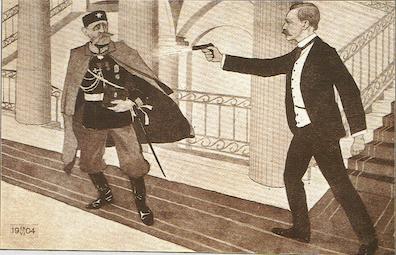Shortly after Stephen and O'Madden Burke join the gathering
in the newspaper office, J. J. O'Molloy alludes to some
breaking news: "was it you shot the lord lieutenant of Finland
between you? You look as though you had done the deed. General
Bobrikoff." The shooting of Finland's Russian governor on the
morning of 16 June 1904 would have held interest for Irish
nationalists.
Nikolai Ivanovich Bobrikov, born in 1839 (not 1857 as
Gifford's and Slote's annotations have it), was a Russian
general and politician whom Tsar Nicholas II appointed in 1898
as Governor-General of Finland and the Finnish Military
District. After Russia's 1808-9 war with Sweden, Finland had
become a Grand Duchy of the Russian empire. The Grand Duke was
the Russian Tsar, represented in his absence by a
Governor-General. In the early decades of this arrangement,
Finland gained a considerable amount of national autonomy,
enjoying independence from bureaucrats not only in Stockholm
but also in St. Peterburg. It had its own borders, a
parliament, a capital, an army, a currency, and postage
stamps, and its language and culture thrived. But Bobrikov was
appointed to institute a policy of "Russification," and Finns
soon came to despise their new governor. The hatred
intensified when the Tsar gave him dictatorial powers in 1903.
At 11 AM Helsinki time on June 16 (8:35 in Dublin), on the
stairs of the Senate building in Helsinki, a Finnish
nationalist named Eugen Schauman shot General Bobrikov three
times and himself twice. Schauman died immediately, Bobrikov
in hospital the next morning. The story was reported on p. 3
of Dublin's Evening Telegraph (the paper that Bloom
peruses in Eumaeus), but the chatter in Aeolus
shows that everyone in the newspaper office has become aware
of it by noon.
O'Molloy jokes about this grave incident ("was it you shot
the lord lieutenant of Finland between you?"), and Stephen
lightheartedly plays along ("We were only thinking about it"),
because many Irish people saw Russia's empire as a brutally
autocratic peer of England's. (They were not alone:
Gifford quotes from a 17 June 1904 story in the The New
York Times that describes Bobrikov as "a typical Russian
tyrant.") Finland's loss of home rule seemed to be
recapitulating Ireland's, and as Slote observes, "The role of
the Russian Governor General in Finland was analogous to that
of the British Lord Lieutenant in Ireland": O'Molloy
inaccurately calls General Bobrikov "the lord lieutenant."
Only moments after the banter about shooting the Russian
governor, Myles Crawford regales his companions with an
account of how Ignatius Gallaher reported the news of the
Phoenix Park murders in 1882, which likewise were aimed at an
emperor's viceregal representatives and likewise "cabled" to
cities like New York at the speed of light.

